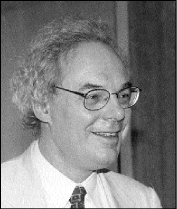Lovejoy team wins major research grant

Distinguished Research Professor Paul Lovejoy is the team leader of an international research project.
York University professor Paul Lovejoy and his colleagues have received a major grant of $1.88 million from the Social Sciences and Humanities Research Council of Canada.
The grant is for the project titled "The Development of the African Diaspora: The Slave Trade of the 'Nigerian' Hinterland, 1650-1900" and was awarded to Lovejoy's team under SSHRC's Major Collaborative Research Initiative (MCRI) program.
A special reception in honour of the award recipients was held recently at York. Brock Fenton, associate vice-president (research and faculties) hosted the reception. The event was held in the Harry Crowe Room (109 Atkinson) on Tuesday, Sept. 8. Approximately 80 books and other publications by the collaborating scholars were on display at the reception. Ten leading journals around the world are edited by members of the team.
Lovejoy's project is affiliated with the UNESCO Slave Route Project. The UNESCO Slave Route Project began at a conference in Ouidah, Benin, in 1994. Lovejoy's project included a core team comprised of: York history professor David Trotman, co-investigator on the project; Robin Law, history professor at Scotland's University of Stirling, who was a visiting professor in York's history department in 1996-97; and Elisée Soumonni, history professor at the Université Nationale du Benin. York's Len Wong, coordinator of information and data systems, also worked on the project.
Professors Law, Lovejoy and Soumonni are members of the International Scientific Committee of the UNESCO Slave Route Project, and they submitted a proposal that was accepted in Angola in 1997 as an affiliated network of collaborative research. Earlier conferences related to this MCRI research area include: a York workshop in 1996, a conference at the University of Stirling in 1996, and York's Summer Institute in 1997, titled "Identifying Enslaved Africans: The Nigerian Hinterland and the African Diasporas."
The following is a description of the project written by Lovejoy.
NIGERIAN HINTERLAND PROJECT:
The Nigerian Hinterland Project is a program of research that focuses on the development of the African diaspora of the "Nigerian" hinterland during the era of the slave trade, from approximately 1650 to 1900. The region under investigation includes the interior of the Bights of Benin and Biafra, from where approximately 40 per cent of all slaves who went to the Americas trace their origins.
In addition, slaves from this region also went to various parts of the Islamic world. The project concentrates on the effects of this population displacement on historical developments both in Africa itself and in the African diaspora. The region identified here as the "Nigerian" hinterland today comprises modern Nigeria, the Republique du Bénin and, to a lesser extent, neighbouring countries (Togo, Ghana, Niger and Cameroon). The program of research is collaborative in nature, involving a network of scholars and institutions which includes those who not only study the development of the African diaspora but who also broadly represent and, moreover, actually come from many of the countries of the diaspora where enslaved "Nigerians" were forced to settle during the era of the slave trade.
The Nigerian Hinterland Project explores the historical impact of Africa on world history as reflected in the development of the African diaspora and the extent to which enslaved Africans and their descendants in the Americas and elsewhere maintained contact with their homelands in the "Nigerian" hinterland. The program of research is intended to facilitate access to primary source material that is widely scattered on four continents and in at least 35 countries.
The project strives to achieve efficient resource allocation in accessing source materials, thereby increasing significantly the availability of data to be analysed for scientific purposes. The process of collecting and analysing materials also includes the training of graduate students. Success in contributing new knowledge to the international scientific community will be gauged by milestones in the form of specific research projects, conferences and workshops, a program for the dissemination of documents, the publication of research results through a variety of electronic and traditional forms, and the graduate degrees awarded to students.
The Nigerian Hinterland Project is associated with the UNESCO Slave Route Project (Intercultural Affairs Division), is funded by the Social Sciences and Humanities Research Council of Canada, and receives institutional support from York University, the University of Stirling (Scotland), the University of Hull (UK), the University of the West Indies (Mona), the Schomburg Center for Research in Black Culture (New York Public Library), Université Nationale du Benin, and various universities sponsoring workshops and conferences, including Emory University, the College of William and Mary, Northwestern University, Universidad da Costa Rica, Universidade Federal da Bahia, and Ahmadu Bello University (Nigeria.
The project's institutional affiliations include: York: Secretariat; York Libraries; York History Department; University of Stirling; Centre for Commonwealth Studies; University of Hull (UK); Schomburg Center for Research in Black Culture (USA); University of the West Indies (Mona); Arquivo Publico do Estado da Bahia (Brazil); Centro de Investigaciones Historicas, Universidad de Costa Rica; Centro do Afro-Asia, Universidade Federal da Bahia (Brazil); Ouidah Institute, Republique du Benin; Arewa House, Ahmadu Bello University (Nigeria) ; Latin American Studies Association (LASA); Centre for Caribbean Studies, University of Warwick (UK).
The MCRI project involves 23 scholars from around the world who are collaborating on the project.



